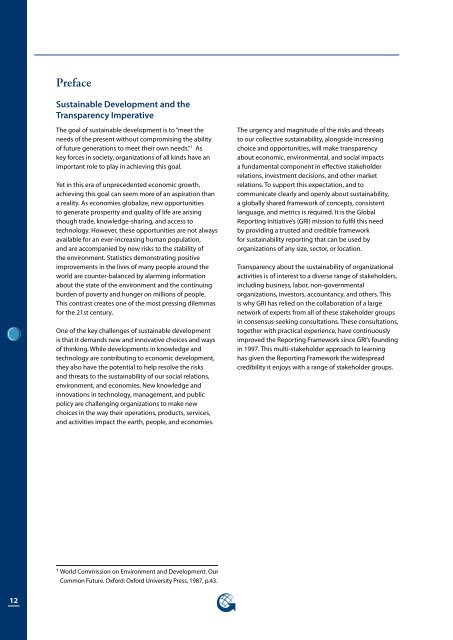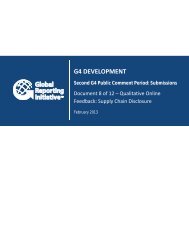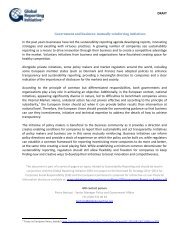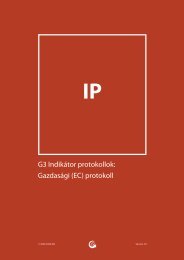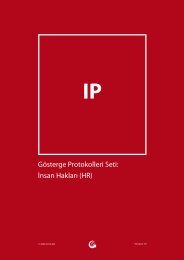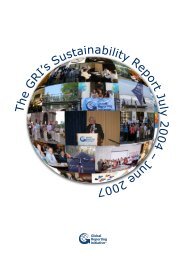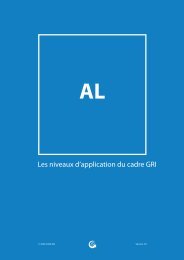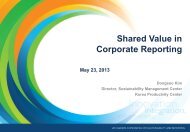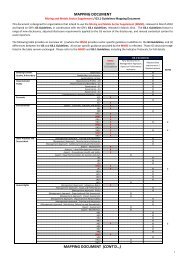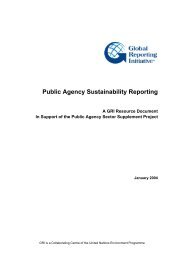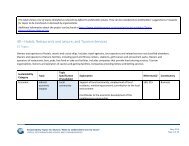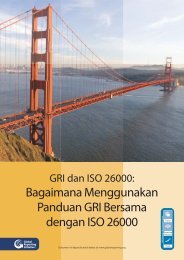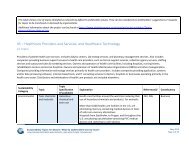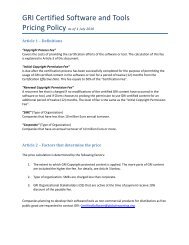Event Organizers Sector Supplement - Global Reporting Initiative
Event Organizers Sector Supplement - Global Reporting Initiative
Event Organizers Sector Supplement - Global Reporting Initiative
Create successful ePaper yourself
Turn your PDF publications into a flip-book with our unique Google optimized e-Paper software.
Preface<br />
Sustainable Development and the<br />
Transparency Imperative<br />
The goal of sustainable development is to “meet the<br />
needs of the present without compromising the ability<br />
of future generations to meet their own needs.” 1 As<br />
key forces in society, organizations of all kinds have an<br />
important role to play in achieving this goal.<br />
Yet in this era of unprecedented economic growth,<br />
achieving this goal can seem more of an aspiration than<br />
a reality. As economies globalize, new opportunities<br />
to generate prosperity and quality of life are arising<br />
though trade, knowledge-sharing, and access to<br />
technology. However, these opportunities are not always<br />
available for an ever-increasing human population,<br />
and are accompanied by new risks to the stability of<br />
the environment. Statistics demonstrating positive<br />
improvements in the lives of many people around the<br />
world are counter-balanced by alarming information<br />
about the state of the environment and the continuing<br />
burden of poverty and hunger on millions of people.<br />
This contrast creates one of the most pressing dilemmas<br />
for the 21st century.<br />
One of the key challenges of sustainable development<br />
is that it demands new and innovative choices and ways<br />
of thinking. While developments in knowledge and<br />
technology are contributing to economic development,<br />
they also have the potential to help resolve the risks<br />
and threats to the sustainability of our social relations,<br />
environment, and economies. New knowledge and<br />
innovations in technology, management, and public<br />
policy are challenging organizations to make new<br />
choices in the way their operations, products, services,<br />
and activities impact the earth, people, and economies.<br />
The urgency and magnitude of the risks and threats<br />
to our collective sustainability, alongside increasing<br />
choice and opportunities, will make transparency<br />
about economic, environmental, and social impacts<br />
a fundamental component in effective stakeholder<br />
relations, investment decisions, and other market<br />
relations. To support this expectation, and to<br />
communicate clearly and openly about sustainability,<br />
a globally shared framework of concepts, consistent<br />
language, and metrics is required. It is the <strong>Global</strong><br />
<strong>Reporting</strong> <strong>Initiative</strong>’s (GRI) mission to fulfil this need<br />
by providing a trusted and credible framework<br />
for sustainability reporting that can be used by<br />
organizations of any size, sector, or location.<br />
Transparency about the sustainability of organizational<br />
activities is of interest to a diverse range of stakeholders,<br />
including business, labor, non-governmental<br />
organizations, investors, accountancy, and others. This<br />
is why GRI has relied on the collaboration of a large<br />
network of experts from all of these stakeholder groups<br />
in consensus-seeking consultations. These consultations,<br />
together with practical experience, have continuously<br />
improved the <strong>Reporting</strong> Framework since GRI’s founding<br />
in 1997. This multi-stakeholder approach to learning<br />
has given the <strong>Reporting</strong> Framework the widespread<br />
credibility it enjoys with a range of stakeholder groups.<br />
1 <br />
World Commission on Environment and Development. Our<br />
Common Future. Oxford: Oxford University Press, 1987, p.43.<br />
12


